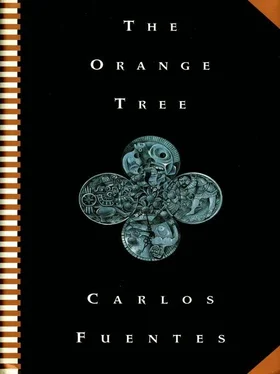I had twenty thousand razors and tweezers confiscated from the troops. I started wearing a two- or three-day beard to give an example of roughness, and in doing so I renounced one of my most sensual habits, one I’d practiced since the age of twenty: keeping my neck clean-shaven. Here we would all let our beards grow until Numantia fell. I banned mirrors.
I threw out the masseurs, who went their way giggling nervously, on the lookout for new bodies. I informed the soldiers that they would no longer need massages to reduce their obesity because from now on we would be eating only roast meat and that no one would be allowed to have more tableware than a copper pot and a plate.
I forbade the use of beds, and I myself set an example by sleeping on common straw.
I arranged things so that each man would bathe himself without the help of whores, masseurs, or orderlies. Only mules, who have no hands, need other hands to wash them.
I ordered daily exercise beginning at dawn for each and every soldier. I urged them on with switches. I used them to discipline those who were Roman citizens. Those who weren’t I ordered to be beaten with rods. But they would all be whipped, whether they deserved it or not, as part of my plan to harden these troops that I had found flaccid, milky, and sleepy.
The daily marches were carried out in perfect formation, and what was previously carried by mules was now carried by the men.
But nothing disciplined them as well or prepared them as well for the long siege to come than my decision to fortify new encampments every day and then have them destroyed the next. First there were expressions of astonishment, instantly followed by disillusion. Then came incipient apathy, which was held in check by the exhausting repetition of the same useless work. All of that told me I’d achieved what I wanted: to temper them against the repeated failure that awaited us before we won our victory.
I organized a geometry of the useless, a physiology of the absurd. Every morning, my men (they were beginning to earn my affection) would dig deep trenches only to fill them up again in the afternoon. They would then immediately march back to our encampment, dragging their feet and grumbling to themselves, first against me and then against their own uselessness. A good soldier should see his first enemy in himself.
Every day they raised high palisades out on the plains: they defended us against nothing and offended no one. We all knew that. The waste was exemplary. The gratuitous acts were perfect in their consummate disinterest. In war, it’s essential to be ready at all times. A soldier is like unclaimed property.
All the neighboring territories from which Numantia received provisions I sacked, destroyed, and then occupied. The brave young men of another Iberian city named Lutia rushed to the aid of their brothers in Numantia. Their courage contrasted with the apathy endemic among our troops. I captured four hundred young men from Lutia, and I ordered the hands of each and every one cut off.
I built seven forts around the city. These I did not order destroyed the next day. When my troops realized that, they cheered me. My acts of discipline had not been, ultimately, gratuitous. The fact is that nothing is gratuitous if it is backed by power. I then gratified the melancholy of my supporters. Their efforts were no longer useless. They never had been. What seemed capricious had merely been an exercise in how to adapt to the possibility of failure. We cannot act unless we have the horizon of failure in mind. Nothing can guarantee constant success to anyone. Actually, failure is the rule, success the exception that confirms it … It’s a sad nation that thinks it deserves the felicity of success. I learned Polybius’s lesson.
I divided the army into seven parts and put a commander in charge of each division. I warned all of them not to abandon their position without prior orders. I would punish withdrawal with death.
The first objective of the forts was to keep anyone from ever leaving Numantia. All exits would be marked by day with a red flag on the tip of a lance. At night, fires would be used. That way everyone would be aware of the danger and we would all close ranks to keep even a single Numantine from leaving.
The first time I was inside Numantia, during the campaign of the unfortunate Lucullus, I noted that its inhabitants used the Douro River to bring in provisions and men. The Numantines were skillful at swimming underwater without being seen and knew how to use light skiffs propelled by sails filled with strong winds.
It was impossible to build a bridge between the two shores. The Douro was too wide, too swift. I gave up on the bridge. Instead, I ordered two towers built on opposite sides of the river. And from each tower I ordered large tree trunks tied over the river, connected to the structures by thick but loose ropes. I covered those trunks with knife blades and lance heads, turning them into wooden hedgehogs. They were untouchable: any hand would avoid contact with that prickly, razor-sharp device. The spiny trunks were in constant movement because of the force of the current. It was impossible to go over, under, or around them.
Let no one be able to leave or enter, no one, let no one know what goes on inside or outside Numantia. (Not even me?)
I finished off my plan by surrounding the city with ditches and dirt walls. That boundary wrapped tightly around the perimeter of the city, which measured twenty-four stadia.
It was then I got the idea that decided Numantia’s fate. Around the city walls, I left open a free space that duplicated the area of the city and its perimeter. In turn, I enclosed that second field with walls eight feet wide and ten feet tall.
That way I established a possible battlefield in which the two armies, if in fact they met, would fight a war itself surrounded this time by the second series of towers and trenches. That is, there were now two Numantias: the walled city of the Celtiberians and the second city, the barren space that duplicated the city, surrounded by my own fortifications.
It was only then that I set up the siege machinery, the catapults, the ranks of archers and slingers, the mountains of darts, and javelins on the parapets.
Then the nephew of King Masinissa, Jugurtha, joined us, bringing that obsessive African contribution: ten elephants. I thanked him for the gesture, but I was afraid of a repetition of the disaster that befell Hasdrubal in his battle against my grandfather, the first Scipio. I invented other places, also hypothetical ones, to which he could take his pachyderms to put some fear into the Spanish people, who were potentially rebellious. For Jugurtha and his elephants, I invented thickets, slag heaps, fields enclosed by wire, all in the land of Arecans, Carpethians, and Pelendons. I think he’s still looking for them. They say elephants never forget, but first they have to remember something. Lost in Spain, Jugurtha’s nine elephants must still be wandering around, gigantic nomads in search of invisible fortresses and fields of mirage. So that I wouldn’t seem discourteous, I kept one elephant for myself, to hold in reserve opposite Numantia.
(Perhaps it was because of that fantastic joke that Jugurtha went back to Africa in a fury and rebelled against Rome, trying to liberate his native Numidia from “Roman political corruption.” But that’s another story.)
For the moment, from the top of the parapet, surrounded by archers and slingers, with the elephants at my back and the Roman army deployed around the seven towers that surrounded Numantia, I felt satisfied. With me were Polybius the historian, the chroniclers, Lucilius the poet, the engineers and sappers, five hundred friends. I myself was dressed not as a Roman warrior and patrician but as an ordinary Iberian commander, with a woolen cloak — the sagum, a simple black cape — over my shoulders to express my grief about Rome’s previous disasters at Numantia. I also ordered the troops to wear black mantles. May our ignominy end here. We shall purge the mourning of our defeats.
Читать дальше












